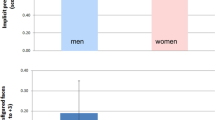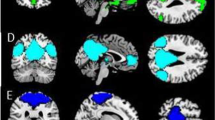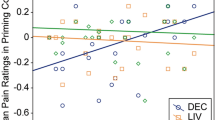Abstract
Huntington's disease can particularly affect people's recognition of disgust from facial expressions1,2, and functional neuroimaging research has demonstrated that facial expressions of disgust consistently engage different brain areas (insula and putamen) than other facial expressions3,4,5. However, it is not known whether these particular brain areas process only facial signals of disgust or disgust signals from multiple modalities. Here we describe evidence, from a patient with insula and putamen damage, for a neural system for recognizing social signals of disgust from multiple modalities.
This is a preview of subscription content, access via your institution
Access options
Subscribe to this journal
Receive 12 print issues and online access
$209.00 per year
only $17.42 per issue
Buy this article
- Purchase on Springer Link
- Instant access to full article PDF
Prices may be subject to local taxes which are calculated during checkout

Similar content being viewed by others
References
Sprengelmeyer, R. et al. Brain 119, 1647–1665 (1996).
Gray, J. M., Young, A. W., Barker, W. A., Curtis, A. & Gibson, D. Brain 120, 2029–2038 (1997).
Phillips, M. L. et al. Nature 389, 495–498 (1997).
Phillips, M. L. et al. Proc. R. Soc. Lond. B Biol. Sci. 265, 1809–1817 (1998).
Sprengelmeyer, R., Rausch, M., Eysel, U. T. & Przuntek, H. Proc. R. Soc.Lond. B Biol. Sci. 265, 1927–1931 (1998).
Scott, S. et al. Nature 385, 254–257 (1997).
Calder, A. J. et al. Cognit. Neuropsychol. 13, 699– 745 (1996).
Ekman, P. & Friesen, W. V. Pictures of Facial Affect (Consulting Psychologists, Palo Alto, California, 1976).
Matsumoto, D. & Ekman, P. Japanese and Caucasian Facial Expressions Of Emotion (JACFEE) and Neutral Faces (JACNeuF) (San Francisco State Univ., San Francisco, 1988).
Lang, P. J., Bradley, M. M. & Cuthbert, B. N. International Affective Picture System (IAPS) (NIMH Center for the Study of Emotion and Attention, 1995 ).
Adolphs, R., Tranel, D., Damasio, H. & Damasio, A. Nature 372, 669–672 (1994).
Chikama, M., McFarland, N. R., Amaral, D. G. & Haber, S. N. J. Neurosci. 15, 9686–9705 (1997).
Small, D. M. et al. Neuroreport 10, 7– 14 (1999).
Rozin, P., Haidt, J. & McCauley, C. R. in Handbook of Emotions (eds. Lewis, M. & Haviland, J.) 575–594 (Guilford, New York, 1993).
Mesulam, M. M. & Mufson, E. J. J. Comp. Neurol. 212, 38–52 ( 1982).
Acknowledgements
We thank NK and his family for their time and assistance. Thanks also to Brian Cox for preparing the graphics.
Author information
Authors and Affiliations
Corresponding author
Rights and permissions
About this article
Cite this article
Calder, A., Keane, J., Manes, F. et al. Impaired recognition and experience of disgust following brain injury . Nat Neurosci 3, 1077–1078 (2000). https://doi.org/10.1038/80586
Received:
Accepted:
Issue Date:
DOI: https://doi.org/10.1038/80586
This article is cited by
-
Emotional processing in patients with single brain damage in the right hemisphere
BMC Psychology (2023)
-
A randomized trial that compared brain activity, efficacy and plausibility of open-label placebo treatment and cognitive reappraisal for reducing emotional distress
Scientific Reports (2023)
-
The association between local brain structure and disgust propensity
Scientific Reports (2022)
-
Insular lobe surgery and cognitive impairment in gliomas operated with intraoperative neurophysiological monitoring
Acta Neurochirurgica (2021)
-
Do I dislike what you dislike? Investigating the effect of disgust on time processing
Psychological Research (2021)



